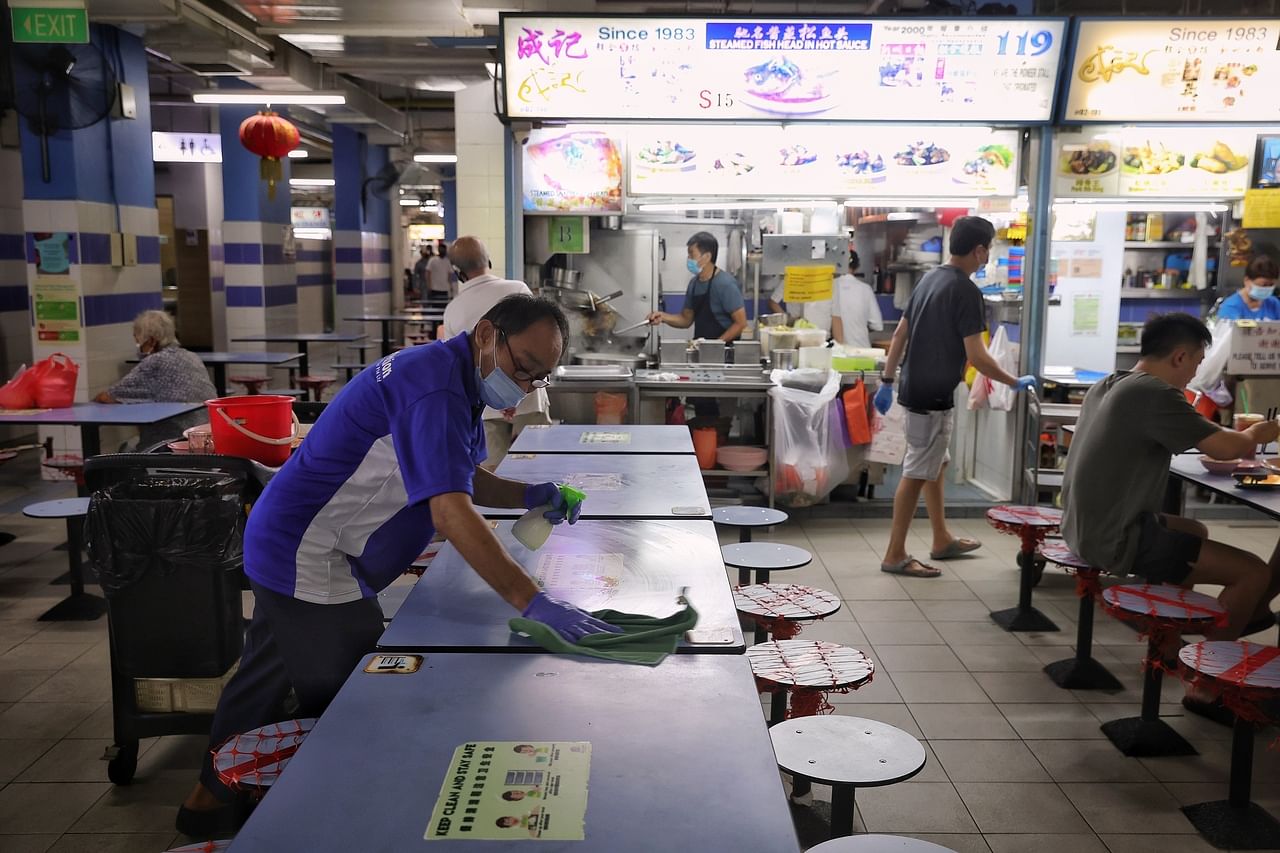Now, who were the agencies, ministers and MPs who said cleaners will not lost their job because of tray return?
Hawkers want cleaning fees cut after new Singapore law requires diners to clear food trays, table litter
Hawkers argued that since diners are returning their own trays, the cleaners' jobs would have been lightened and the fees should be reduced.
ST PHOTO: KEVIN LIM
Joyce Lim
Senior Correspondent
NOV 11, 2021
SINGAPORE - Some cleaning contractors are locked in a dispute with hawkers over tray-clearing and table-cleaning fees after a new law kicked in which
requires diners to clear their own food trays and table litter.
Hawkers argued that since diners are returning their own trays, the cleaners' jobs would have been lightened and the fees should be reduced.
But cleaning firm owners told The Straits Times that while the new tray-return rule might have changed their workers' job scope, the number of people required to keep hawker centres clean remains the same.
Instead of clearing used crockery and litter on tables, the cleaners are now deployed to the various tray-return stations, where they would sort out the crockery and return them to the stallholders, they said.
Mr Vincent Goh, managing director of Perfection General Services, which provides tray-clearing and table-cleaning services to 226 food stalls in Chinatown Complex Food Centre, said that since the Covid-19 pandemic last year, it has been increasingly challenging to collect cleaning fees from hawkers.
About $60,000 in cleaning fees were owed to him last year. By the end of last month, an additional $200,000 was owed by hawkers.
After the Chinatown Complex Hawkers' Association and the National Environment Agency (NEA) intervened to speak to the stallholders, Mr Goh managed to recover about $60,000 in arrears this month.
"The hawkers gave excuses like poor business. Some said they were down with Covid-19 or they had to serve the stay-home notice and couldn't open their stalls for business," said Mr Goh, 46, who collects between $205 and $480 a month per stall from the hawkers.
"The latest excuse I get now is that since the law has made it mandatory for diners to return their own trays, tray-clearing service is no longer needed."
Mr Goh lamented that many of the hawkers do not see the back-end work that has to be done, such as washing the trays.
"When diners return their trays to the tray stations, they just stack trays on top of one another. Very often the unfinished food and drinks would spill out of the bowls and onto the trays. So now we have an extra task of washing all the trays before distributing them to the hawkers," he explained.
Last month, cleaning contractor Tee Kek Ling, 76, wrote to the ST Forum page to highlight his
difficulty in collecting payment from hawkers and urged the authorities to look into the well-being of cleaning contractors as well.
He said most of the workers he hires are "old, partially disabled or come from underprivileged families".
"As their jobs are relatively unskilled in nature, they take home meagre wages to feed themselves and their families," said Mr Tee, who provides cleaning services to four hawker centres in Marine Parade, Eunos, Kallang Bahru and Tampines.
"When cleaning contractors are financially strapped because of payment defaults and are unable to pay wages, these workers who are living from hand to mouth will face severe hardship in their lives."
Mr Tee said that more than 20 stallholders owed him cleaning fees before his letter was published in the ST Forum page.
The authorities and various hawker associations have since stepped in to mediate and helped him to recover some of his cleaning fees.
Another cleaning contractor, who wanted to be known as Mr Tay, said he tried to understand the hawkers' plight and reduced his fees by $50 for at least four months between last September and January this year.
"Now with the tray-return law, the hawkers are asking for further reduction. I can't sustain my business if I have to reduce my fees further," said the 53-year-old.
Since June 1, it has been mandatory for diners to return their trays and clear their table litter.
NEA started
carrying out enforcement from Sept 1.
The majority of the hawkers whom ST spoke to questioned the need to pay for tray-clearing service following the new rule.
Ms Michelle Yee, 37, who runs Hakka Hamcha and Yong Tou Fu stall in Chinatown Complex, said: "Since there is no need for cleaners to go around the hawker centre to collect the plates and trays, why do we still need to pay for tray-clearing service?"
When told of the back-end work that cleaning contractors said they had to do, Ms Yee disagreed.
"I also don't see that many cleaners walking around to clean the tables. I feel that the cleaning fees should be reduced," she added.
A cleaner from Perfection General Services washing trays at Chinatown Hawker Centre on Nov 8, 2021. ST PHOTO: KEVIN LIM
Mr Gan Thiam Poh, an MP for Ang Mo Kio GRC who sits on the Government Parliamentary Committee for Sustainability and the Environment, said it will take time to get all diners to return their food trays. But the new rule should lessen the workload of cleaners, he noted.
"Now they (cleaners) don't have to collect the trays, but we still need them to wipe the tables. But if customers keep the tables clean, then there's not so much work," said Mr Gan, who suggested that NEA come up with some guidelines on cleaning fees.
He does not think that the tray-clearing law would lead to elderly cleaners losing their jobs.
"Currently, the industry is facing a labour shortage. There is a quota for foreign workers. The cleaning firms will need to hire Singaporeans to meet the quota before they can hire more foreigners," said Mr Gan.
"The cleaners' job scope will change, but their jobs will not be totally gone."
There are 110 hawker centres managed by NEA or NEA-appointed operators.
About 80 have contracted cleaning companies to provide table-cleaning services. While the contacts were negotiated by the centres' hawkers' associations on behalf of all stallholders, the cleaning companies are paid directly by the stallholders.
A cleaner disinfecting the tables at Chinatown Hawker Centre on Nov 8, 2021. ST PHOTO: KEVIN LIM
For the remaining centres, which have integrated cleaning contracts that combine table-cleaning and general cleaning, the stallholders pay the service providers through NEA.
Responding to queries from ST, an NEA spokesman said that despite the new rule, "cleaners are still required to maintain and upkeep the general cleanliness of the dining areas of hawker centres, including wiping and sanitising tables, and clearing and sorting dirty crockery at designated tray and crockery return points".
The spokesman added: "Amid the Covid-19 situation, the demands on cleaners have in fact increased."
From mid-May to August, all stallholders were given 3½ months' worth of rental waivers to help them cope with the Covid-19 situation. NEA also provided three months of subsidies for table-cleaning and centralised dishwashing services to all cooked food stallholders this year. All stallholders also received a one-time $500 under the Market and Hawker Centre Relief Fund.
NEA and the Jalan Besar Town Council are aware of the issues raised by stallholders at Chinatown Complex.
"When stallholders and table-cleaning companies encounter issues, NEA will work with the respective hawkers' association to facilitate engagements between stallholders and the cleaning companies on ways to improve service delivery, or to resolve issues such as non-payment of cleaning fees," said the NEA spokesman.
She added that NEA and the Chinatown Complex Hawkers' Association continue to engage the stallholders to resolve the outstanding arrears.












